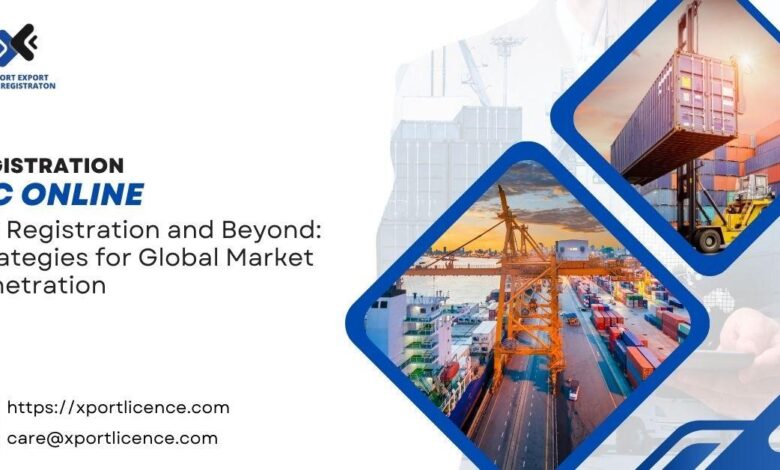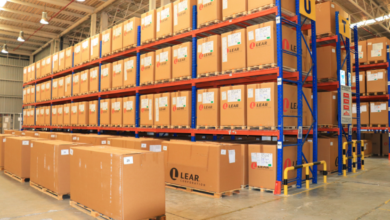IEC Registration and Beyond: Strategies for Global Market Penetration

Introduction
In today’s interconnected world, expanding into international markets is no longer an option but a necessity for businesses aiming for sustained growth. One crucial step in this journey is obtaining an Importer Exporter Code (IEC) registration. However, successful global market penetration involves more than just obtaining this code. In this comprehensive guide, we explore strategies that go beyond IEC registration to facilitate effective global market penetration.
Understanding the Significance of IEC Registration
Before delving into broader strategies, it’s essential to understand the significance of IEC registration. An IEC is a unique 10-digit code issued by the Directorate General of Foreign Trade (DGFT), which is mandatory for any business engaged in importing or exporting goods and services from India. This registration not only ensures compliance with regulatory requirements but also serves as a primary identifier for customs authorities during international trade transactions.
Leveraging IEC Registration for Market Research
One strategic approach to global market penetration is leveraging IEC registration to conduct thorough market research. Armed with an IEC, businesses can access valuable trade data and statistics through various government portals and international databases. This information helps in identifying lucrative markets, understanding consumer preferences, and evaluating competitive landscapes, laying a solid foundation for market entry strategies.
Building Strong Partnerships through IEC Registration
Establishing partnerships with reliable distributors, agents, or suppliers is paramount for successful market penetration. With an IEC in hand, businesses can confidently approach potential partners, demonstrating their legitimacy and commitment to international trade. Moreover, IEC registration instills trust among overseas partners, as it signifies adherence to regulatory standards and facilitates smooth transaction processes, thereby fostering long-term collaborations.
Customizing Products and Services for Global Markets
Adapting products and services to meet the specific needs and preferences of target markets is essential for gaining a competitive edge globally. IEC registration enables businesses to participate in international trade exhibitions, networking events, and industry conferences, providing valuable insights into local market demands and emerging trends. Armed with this knowledge, businesses can tailor their offerings to resonate with diverse customer segments, driving demand and fostering brand loyalty.
Navigating Regulatory Hurdles with IEC Registration
Global market penetration often entails navigating a complex web of regulatory requirements and compliance standards. IEC registration serves as a crucial tool in this regard, streamlining the process of obtaining necessary licenses, permits, and certifications for exporting goods and services to different countries. By ensuring adherence to regulatory frameworks, businesses can mitigate risks, avoid penalties, and maintain a positive reputation in international markets, thereby enhancing their market penetration efforts.
Harnessing Digital Platforms for Global Outreach
In today’s digital age, leveraging online platforms and e-commerce channels is indispensable for reaching global audiences effectively. With IEC registration, businesses gain access to various government schemes and incentives aimed at promoting exports and facilitating e-commerce activities. Whether through international marketplaces, social media platforms, or dedicated e-commerce websites, businesses can leverage their IEC to showcase their products/services, engage with customers, and facilitate seamless transactions across borders, thereby expanding their market reach exponentially.
Investing in Talent and Infrastructure
Successful global market penetration requires more than just paperwork; it demands strategic investments in talent and infrastructure to support international operations effectively. With IEC registration, businesses can access financial assistance, tax incentives, and export promotion schemes offered by government agencies to facilitate infrastructure development, technology adoption, and skill enhancement initiatives. By investing in capabilities such as supply chain optimization, logistics management, and cross-cultural training, businesses can enhance their competitiveness and resilience in global markets.
Identifying Target Markets
One of the key benefits of IEC registration is the ability to explore new markets with ease. Armed with this registration, businesses can conduct comprehensive market research to identify potential opportunities and assess market demand in different regions. By analyzing factors such as consumer preferences, purchasing power, and regulatory environment, companies can pinpoint target markets where their products or services are likely to thrive, laying the groundwork for effective market expansion strategies.
Building a Strong Export Network
IEC registration not only allows businesses to engage in direct export activities but also opens doors to collaboration with export-oriented organizations and trade promotion agencies. By leveraging these networks, companies can gain valuable insights into market dynamics, access distribution channels, and forge partnerships with local distributors, wholesalers, or retailers. Building a robust export network not only enhances market reach but also facilitates market entry by leveraging the expertise and resources of local partners.
Customizing Marketing Strategies
Expanding into new markets requires a tailored approach to marketing and communications. With IEC registration, businesses can develop targeted marketing campaigns that resonate with the cultural, linguistic, and socio-economic nuances of their target audience. Whether through localized advertising, digital marketing channels, or influencer partnerships, companies can leverage their IEC registration to establish a strong brand presence and effectively communicate their value proposition to potential customers in foreign markets.
Streamlining Logistics and Supply Chain
Efficient logistics and supply chain management are critical for successful market expansion. IEC registration enables businesses to streamline international shipping, customs clearance, and freight forwarding processes, reducing lead times and operational costs associated with cross-border trade. By partnering with experienced logistics providers and leveraging technology solutions such as track-and-trace systems and inventory management software, companies can ensure the timely delivery of goods and maintain high levels of customer satisfaction in new markets.
Compliance and Risk Management
Navigating regulatory requirements and mitigating risks are integral aspects of expanding into new markets. IEC registration demonstrates a company’s commitment to compliance with international trade regulations and standards, instilling confidence among stakeholders and regulatory authorities. By staying abreast of changes in trade policies, tariff regulations, and export controls, businesses can proactively manage risks and ensure smooth market entry and operations in foreign jurisdictions.
Note : Note: Click here to Renew your IEC – IEC RENEWAL
Conclusion
While IEC registration is a crucial prerequisite for international trade, achieving sustainable global market penetration requires a multifaceted approach. By leveraging IEC registration as a springboard, businesses can embark on a journey of strategic market research, partnership building, product customization, regulatory compliance, digital outreach, and infrastructure investment to drive successful expansion into international markets. With careful planning, execution, and continuous adaptation, businesses can overcome barriers, seize opportunities, and establish a strong foothold in the global marketplace.






